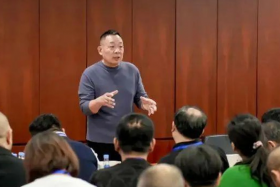Local factories gearing up for Fourth Industrial Revolution
Local factories need to be ready for Fourth Industrial Revolution, in which technology is used intensively
A new wave of technological change is sweeping the global manufacturing sector, and factories here are positioning themselves to be at the heart of this transformation.
The so-called Fourth Industrial Revolution - also known as Industry 4.0 - is giving rise to breakthroughs in advanced manufacturing and creating "smart factories", where man and machine work together seamlessly.
A key focus of the shift to higher-value manufacturing involves adopting technologies such as robotics, cloud computing and 3D printing.
Multinationals and larger manufacturers here have already started implementing some of these new technologies in their factories, but the transition will likely be tougher for small and medium-sized enterprises (SMEs).
Dr Gunther Kegel, chief executive officer of automation and sensor technology manufacturer Pepperl+Fuchs, said the industrial Internet of Things (IOT) - which will connect machines and systems and allow seamless data transmission across the factory floor - will open up opportunities for new business models in manufacturing.
The Germany-headquartered firm is no stranger to Industry 4.0. It opened a $65 million global distribution centre in Jurong last October, featuring an intelligent warehouse management software system and an automated storage and retrieval system enabled by IOT capabilities.
Another company beefing up its Industry 4.0 capabilities is precision engineering firm Makino Asia, which is investing in a new "smart factory" near its existing facility in Gul Avenue.
President and chief executive Neo Eng Chong said the size of the investment has not yet been made public but is "substantial".
BOOST
The project is expected to span five years and, when complete, would help the company boost productivity, improve quality and increase capacity without needing to hire more manpower.
Meanwhile, the Agency for Science, Technology and Research (A*Star) has announced that it will launch two model factories to provide a learning environment for companies to experience advanced manufacturing technologies.
About 500 SMEs are expected to benefit from the move over a span of five years.
One of the model factories will be based at the Singapore Institute of Manufacturing Technology (SIMTech). The other will be at A*Star's Advanced Remanufacturing and Technology Centre.
Both are expected to be operational by the fourth quarter.
Despite these developments, Singapore manufacturers might still have some catching up to do.
Global industrial powerhouse Germany, for instance, is investing more than 200 million euros (S$297 million) to spur research in Industry 4.0 across government, academia and business in a bid to become a leader in advanced manufacturing.
The fact remains that it can be very costly for firms - especially SMEs - to invest in advanced manufacturing and build factories of the future.
Singapore manufacturers need to adopt Industry 4.0 to remain globally competitive, but most companies here are "only at Industry 2.5, maybe 3.0", said International Enterprise Singapore's Frankfurt centre director Wu Hongyi in an interview last November. - ADDITIONAL REPORTING BY SAMUEL CHAN
FOR MORE, READ THE STRAITS TIMES TODAY
Get The New Paper on your phone with the free TNP app. Download from the Apple App Store or Google Play Store now


